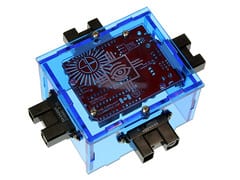Our friends at Bare Conductive, whose awesome lineup of products we carry, shared a few more interesting how-to tutorials (previously).

Project Monday: All-Seeing Eye
 This week's project is coming to you fresh from Alex, an engineer in our R&D department, with some help from Yana, our graphic designer. They've developed an enclosure based on the SAFE that accommodates sensor mounts on each side in addition to an Arduino-style board within. And after putting on some short range and long range I2C-IT sensors and hooking them up to a Freeduino SB, BAM! INSTANT QUAD-DIRECTIONAL SENSOR ACTION! The module (called the All-Seeing Eye) is able to track distance (and motion) on each of the four sides. Here's a video we shot last week of it in action:
This week's project is coming to you fresh from Alex, an engineer in our R&D department, with some help from Yana, our graphic designer. They've developed an enclosure based on the SAFE that accommodates sensor mounts on each side in addition to an Arduino-style board within. And after putting on some short range and long range I2C-IT sensors and hooking them up to a Freeduino SB, BAM! INSTANT QUAD-DIRECTIONAL SENSOR ACTION! The module (called the All-Seeing Eye) is able to track distance (and motion) on each of the four sides. Here's a video we shot last week of it in action:
Because it's based on the SAFE, it's automatically compatible for mounting (and use) with both the DragonTail and Brutusbot. Check out more photos of it on our Flickr stream. In the meantime, we'll continue refining it to possibly release it as a bundle in the near future.
MORE POSTS
Cosplay at Solarbotics We have a bit of a rule here. If there's a project we want to do, somebody has to have the passion for it. The drive, the dedication, the "kick-the-right-people-in-the-butt-to-get-it-done" drive. In this case, the project is a Rainbow Brite Dress, as spear-headed by our warehouse chief-elf Lyn Janelle (costume concept, design […]
Hi all. It's coming up time for the annual Western Canadian Robot Games on May 13th, and as per usual, Solarbotics will be hosting our post-event wind-down. Interested in coming? Let us know here!
So it turns out that we've underestimated the email services of the world. This has led to frustrations for some of our loyal users in reclaiming their email with the new website. We're sorry people. Completely our bad on that one. The good news is that testing so far shows that the issues should now […]
Solarbotics, Ltd. is not responsible for misprints or errors on product prices or information. For more information, please see our Terms and Conditions.
Warning: This product contains chemicals known to the State of California to cause cancer and birth defects or other reproductive harm.
Please visit www.P65Warnings.ca.gov for more information. This item was manufactured prior to August 31, 2018.

